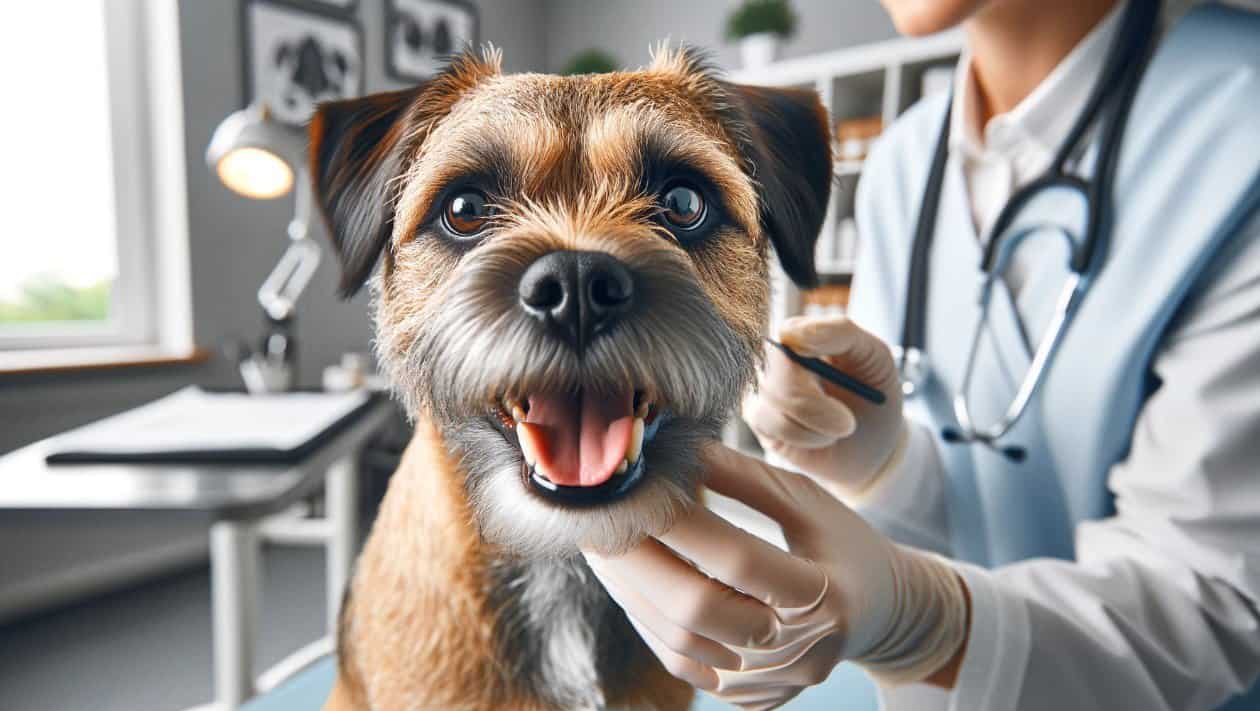Hi there, I’m Dr. Candy, your friendly holistic veterinarian. Today, I want to talk about something that’s often overlooked but incredibly important for your furry friend’s well-being – Border Terrier Dental Health. Did you know that dental health is just as crucial for dogs as it is for us humans? It’s true! In fact, maintaining your Border Terrier’s oral health can significantly impact their overall health.
Unfortunately, Border Terriers, like many other breeds, are prone to certain dental issues. But don’t worry, as a holistic vet, I’m here to guide you through the signs of dental disease, common dental health issues specific to Border Terriers, and both conventional and holistic treatment options.
Let’s get started on this journey to ensure your Border Terrier has the best dental care possible. Remember, a healthy mouth leads to a happy, healthy dog!

Signs of Dental Disease in Border Terrier
As a dedicated dog parent, you’re undoubtedly committed to ensuring your Border Terrier’s health and happiness. However, it’s important to acknowledge that dental health is often overlooked, yet it plays a significant role in the overall well-being of your furry friend. Understanding the signs of dental disease in Border Terriers is the first step towards ensuring a healthy, vibrant smile for your pet.
Just like us, our furry friends can suffer from dental problems. The most common sign of dental disease in Border Terriers is bad breath. While it’s normal for your dog to have a slightly different smell to their breath, a persistent, foul odor can be an indication of periodontal disease. If you notice this, it’s crucial to seek veterinary advice immediately.
Another sign to look out for is a change in eating behavior. If your Border Terrier is suddenly disinterested in food, particularly hard kibble, or is eating on one side of the mouth, it could be due to oral discomfort. Likewise, excessive drooling, especially if it’s tinged with blood, can be a sign of dental disease.
Visible changes in your dog’s mouth are also signs of potential dental problems. These can include red, swollen, or bleeding gums, yellow or brown tartar on the teeth, broken or loose teeth, or even a visible mass or lump in the mouth. Regularly checking your Border Terrier’s mouth for these signs is an excellent preventative measure.
Lastly, behavioral changes such as irritability, lethargy, or pawing at the mouth may indicate oral discomfort. As a responsible dog owner, it’s essential to pay attention to these subtle changes in your pet’s behavior.
Remember, early detection is key when it comes to treating dental disease in Border Terriers. So, make sure to keep a keen eye out for these signs and take your furry friend for regular dental check-ups. Together, we can ensure your Border Terrier maintains excellent dental health and a happy, healthy life.
Common Dental Health Issues in Border Terrier
As a veterinarian, I’ve seen a range of Border Terrier Dental Health issues. These lovable, energetic dogs are prone to certain dental problems that every Border Terrier parent should be aware of.
One of the most common issues is Periodontal Disease. This is an infection of the tissues surrounding the teeth and can lead to tooth loss if not treated promptly. Symptoms include bad breath, red or swollen gums, and difficulty eating.
- Dental Plaque and Tartar: Border Terriers, like other breeds, are susceptible to plaque and tartar buildup. Without regular brushing, this can lead to gum disease and tooth decay.
- Broken Teeth: Border Terriers love to chew, and sometimes their enthusiasm can lead to broken teeth. This is painful and can lead to infections.
- Oral Growths: While less common, Border Terriers can develop oral growths or tumors. Regular dental check-ups can help catch these early.
Addressing these Border Terrier Dental Health issues promptly can help your furry friend lead a happier, healthier life. Remember, prevention is always better than cure. Regular dental check-ups, a healthy diet, and good oral hygiene practices at home are key to keeping your Border Terrier’s teeth healthy.

Conventional Dental Health Treatments
When it comes to Border Terrier Dental Health, there are a couple of conventional treatments that you might consider for your furry friend.
Anesthetic Dental Cleanings
First up is anesthetic dental cleanings. This is a professional procedure carried out by a vet, where your Border Terrier will be put under anesthesia. The vet will then perform a thorough cleaning of the teeth, gums, and mouth. This process not only removes tartar and plaque build-up but also helps to prevent the onset of dental diseases.
However, though effective, anesthetic dental cleanings do come with their risks. Your Border Terrier’s age, overall health, and potential drug sensitivities should be considered before opting for this procedure.
Potential Individual Health Obstacles
Speaking of health obstacles, there are a few that could impact your Border Terrier’s dental health. For instance, heart problems could pose a risk during anesthetic dental cleanings. If your Border Terrier has a heart condition, it’s crucial to discuss this with your vet before any procedure.
Drug sensitivities are another concern. Some Border Terriers might have adverse reactions to the anesthesia used during dental cleanings. This could result in complications during or after the procedure.
Seizures are yet another obstacle to consider. If your Border Terrier has a history of seizures, certain medications used during dental procedures could trigger an episode.
Lastly, age is a significant factor. Older Border Terriers might have a higher risk of complications during anesthetic dental cleanings. They may also have a slower recovery rate, making the procedure more challenging.
Despite these potential obstacles, remember that maintaining your Border Terrier’s dental health is crucial. Regular cleanings, whether at home or by a professional, can help prevent dental diseases and keep your furry friend’s mouth healthy. Always discuss any health concerns with your vet to ensure the safest and most effective treatment for your Border Terrier.
Remember, Border Terrier Dental Health is not just about fresh breath – it’s about overall health and longevity for your beloved pet.
Dr. Candy’s Holistic Approach To Oral & Dental Health
As a dedicated pet parent, you want the best for your Border Terrier, and this includes their dental health. Let me share with you Dr. Candy’s holistic approach to oral and dental health. This method is not only about addressing the symptoms of dental issues but also about preventing them from happening in the first place.
Diet- Low Carbs, Avoid Added Sugars, Enzymes In Fresh Food
The first step in this holistic approach is to focus on your Border Terrier’s diet. Feeding your dog a diet low in carbohydrates and free from added sugars can significantly improve their dental health. Carbohydrates, especially sugars, are known to provide a breeding ground for harmful bacteria in the mouth, which can lead to dental problems such as plaque and tartar build-up.
Instead, consider incorporating more fresh foods into your dog’s diet. Fresh foods are packed with natural enzymes that can help maintain oral health. These enzymes can break down food particles and prevent them from sticking to your dog’s teeth. Here’s a quick list of enzyme-rich foods you might want to consider:
- Raw carrots
- Apples
- Pineapple
- Papaya
Remember, these should be given in moderation and should not replace your dog’s regular meals.
Oral Health Specific Probiotics
Another crucial aspect of Dr. Candy’s holistic approach is the use of oral health-specific probiotics. Probiotics are beneficial bacteria that can help balance the oral microbiome, preventing the overgrowth of harmful bacteria that can lead to dental disease. One such product that I highly recommend is Probiora for Dogs, an oral health-targeted probiotic.
This probiotic is specially formulated to target the specific bacteria in your dog’s mouth, promoting overall oral health. It’s easy to use – you just sprinkle it on your dog’s food once a day, and it goes to work, helping to prevent bad breath, plaque, and tartar.
Remember, while these steps can significantly aid in maintaining your Border Terrier’s dental health, they are not a substitute for regular veterinary check-ups. Always consult with your vet for the best dental care practices for your furry friend.
So, let’s take a step towards improving our Border Terrier’s dental health with this holistic approach. After all, a healthy mouth leads to a happy dog!

Recommended Dental Chews & Products For Border Terrier
One of the most common misconceptions about oral health in Border Terriers is the effectiveness of commercially promoted dental chews. The truth is, many of these products fail to deliver on their promises and can even be harmful to your dog’s dental health. They often contain artificial ingredients and preservatives which can lead to other health issues. Furthermore, they are usually hard and can fracture your dog’s teeth.
Another product that has been gaining popularity is drinking water additives. While they may seem like a convenient solution to keep your dog’s mouth clean, they can actually harm the beneficial bacteria in your dog’s gut. Hence, it’s essential to choose dental products wisely.
When it comes to dental chews and products for your Border Terrier’s dental health, the focus should be on single-source natural proteins. Here’s a list of Dr. Candy’s recommended dental chews and products:
- Tendons: These are a fantastic choice for dental health. They are tough enough to provide a good chew, which can help in removing plaque and tartar, but not so hard that they risk fracturing your dog’s teeth.
- Raw Marrow Bones: These are another excellent choice. They are a natural source of calcium and phosphorus, which are essential for healthy teeth and gums. Plus, the marrow inside is a tasty treat that your dog will love.
- Bully Sticks: These are made from 100% beef and are a great source of protein. They are also long-lasting and can help reduce plaque and tartar build-up.
Border Terrier Dental Health is not something that should be overlooked. With the right products and a little bit of your time, you can ensure your furry friend has a healthy mouth for years to come.
Frequently Asked Questions
Q: How can I prevent bad breath in my Border Terrier? A: Regular brushing of your Border Terrier’s teeth with a dog-specific toothbrush and toothpaste can help prevent bad breath. Additionally, providing dental chews or toys designed to promote oral health can also be beneficial.
Q: What are some signs of dental problems in Border Terriers? A: Signs of dental problems may include bad breath, swollen or bleeding gums, difficulty eating, loose or missing teeth, excessive drooling, and reluctance to have their mouth touched. If you notice any of these signs, it is important to consult a veterinarian.
Q: Can diet affect my Border Terrier’s dental health? A: Yes, diet can play a role in your Border Terrier’s dental health. Feeding a balanced diet that includes appropriate dental care components, such as crunchy kibble or dental treats, can help reduce plaque and tartar buildup.
Q: How often should I have my Border Terrier’s teeth professionally cleaned? A: The frequency of professional dental cleanings can vary depending on your dog’s individual needs and the recommendation of your veterinarian. In general, it is recommended to have a dental cleaning performed by a veterinarian once a year or as advised.
Q: Are there any home remedies for bad breath in Border Terriers? A: While there are some home remedies that may provide temporary relief, it is important to address the underlying cause of bad breath. Consult with a veterinarian to determine the best course of action for your Border Terrier’s specific needs.
